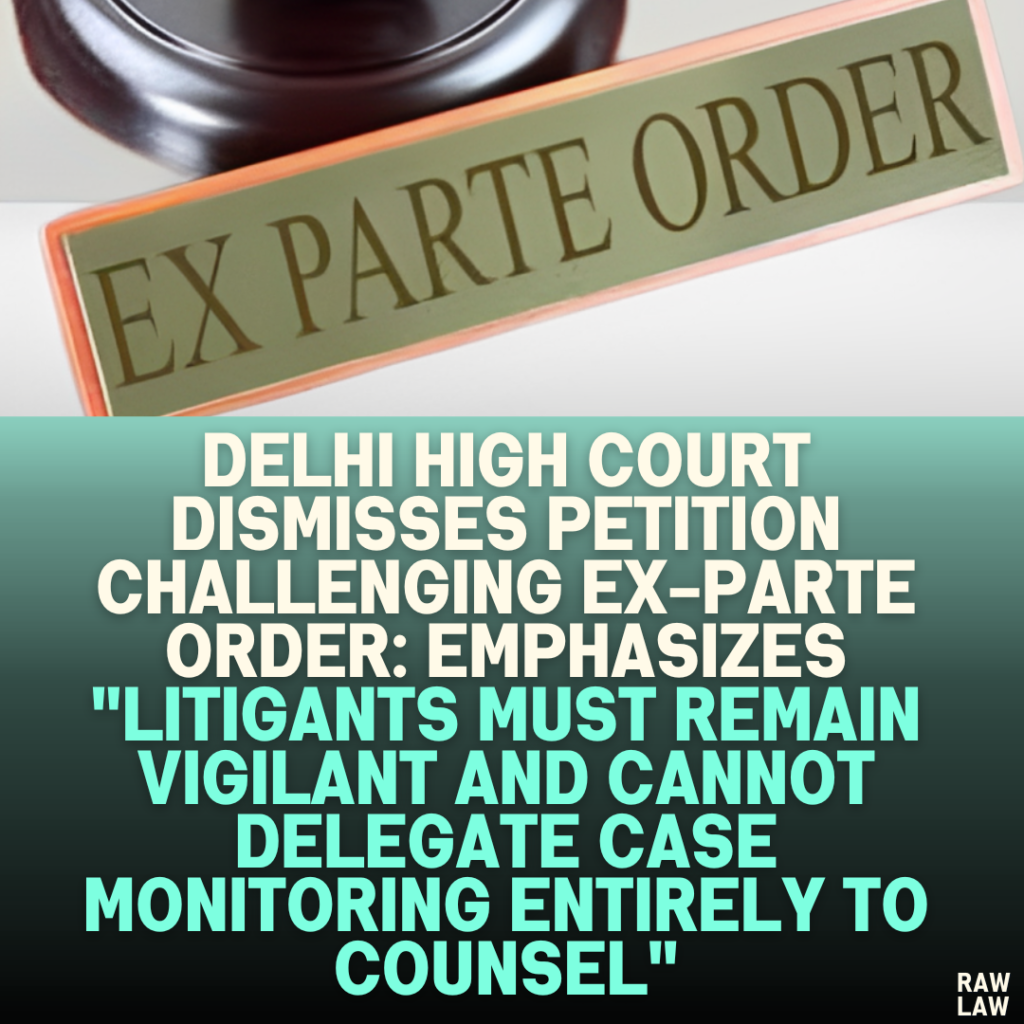Court’s Decision:
The Delhi High Court dismissed a petition under Article 227 of the Constitution of India filed by the petitioner, challenging an order of the trial court that had declined to recall an ex-parte order. The High Court held that the petitioner had failed to establish sufficient cause for its non-appearance on the relevant date and emphasized that litigants cannot delegate the responsibility of monitoring cases solely to their counsel. While dismissing the petition, the court granted the petitioner liberty to file an application for permission to lead evidence at the stage of final arguments.
Facts:
- The case originated from a recovery suit filed by the respondent (plaintiff in the trial court) against the petitioner.
- On August 18, 2023, when the matter was scheduled for the recording of the plaintiff’s evidence, neither the petitioner nor their counsel appeared. Consequently, the trial court discharged the plaintiff’s witness (PW-1) and closed the plaintiff’s evidence under Order 17 of the Code of Civil Procedure (CPC).
- Subsequently, the petitioner filed an application under Order 9 Rule 13 CPC to recall the ex-parte order, citing unavoidable circumstances for its absence. The application was treated by the trial court as one under Order 9 Rule 7 CPC and was dismissed on September 3, 2024.
- Aggrieved, the petitioner approached the High Court seeking to set aside the trial court’s order.
Issues:
- Did the trial court err in refusing to recall the ex-parte order?
- Did the petitioner establish sufficient cause for its absence on August 18, 2023?
Petitioner’s Arguments:
- The petitioner contended that their non-appearance on August 18, 2023, was not intentional but due to unavoidable circumstances:
- The counsel engaged by the petitioner was suffering from eye-flu and was advised 15 days of rest to avoid exposure to light.
- The father of the Director of the petitioner company was unwell, which compounded the situation and prevented the Director from appearing in court.
- It was argued that once the previous counsel regained her health, the petitioner promptly filed the application to recall the ex-parte order, explaining the reasons for non-appearance.
- The petitioner asserted that the trial court failed to properly consider the medical certificate of the counsel and did not appreciate the challenges faced by the petitioner.
Respondent’s Arguments:
- The respondent opposed the petition, highlighting the petitioner’s repeated absence during previous hearings:
- The petitioner had failed to appear on February 7, 2023, and March 31, 2023, indicating a pattern of negligence.
- The written statement submitted on behalf of the petitioner was signed by the company’s Manager, who was also absent on the relevant date.
- It was argued that the petitioner’s absence was deliberate, aimed at delaying the proceedings, as no alternative arrangements (e.g., representation by the Manager or another official) were made to address the matter.
Analysis of the Law:
- Order 17 Rule 2 CPC:
This provision allows a court to proceed with the suit in case of non-appearance of parties on the scheduled date of hearing. It empowers the court to dispose of the case in one of the modes prescribed under Order 9 CPC. - Order 9 Rule 7 CPC:
This provision allows a defendant who appears on the adjourned hearing date to explain their previous absence. If the explanation is found satisfactory, the court may permit the defendant to be heard in the suit. - The High Court observed that while the petitioner’s counsel had indeed been diagnosed with eye-flu and advised rest, the discharge summary did not specifically prescribe bed rest or indicate that she was incapacitated to the extent that she could not attend court proceedings. Furthermore, no medical records were submitted to substantiate the illness of the Director’s father, which was cited as an additional reason for absence.
Precedent Analysis:
The High Court underscored the principle that litigants have an ongoing responsibility to monitor their cases. Delegating this responsibility entirely to counsel does not absolve them from ensuring that proceedings are not disrupted. Courts have consistently held that repeated negligence or failure to appear without good cause cannot be condoned, as it undermines the judicial process.
Court’s Reasoning:
- The petitioner’s explanation for its non-appearance was deemed inadequate:
- The medical certificate submitted by the counsel did not specify that she was advised bed rest or that she could not attend court.
- The petitioner failed to provide medical records to substantiate its claim regarding the illness of the Director’s father.
- The absence of the Manager, who had previously signed pleadings on behalf of the company, was unexplained.
- The court noted that the petitioner had failed to diligently monitor the case:
- A litigant cannot abandon the responsibility to oversee their case entirely, even if the case is entrusted to a lawyer.
- The petitioner’s absence on multiple occasions suggested a lack of seriousness in pursuing the matter.
- The trial court had acted within its jurisdiction under Order 17 Rule 2 CPC by closing the plaintiff’s evidence and proceeding ex-parte. There was no illegality or impropriety in its decision.
Conclusion:
The High Court dismissed the petition, holding that the petitioner had failed to establish sufficient cause for its non-appearance on the relevant date. However, considering the trial court’s ongoing proceedings, the petitioner was granted liberty to file an application for permission to lead evidence during the final arguments.
Implications:
This decision reinforces the principle that litigants must remain vigilant and proactive in monitoring their cases, even when represented by counsel. It also emphasizes the need for litigants to substantiate claims of unavoidable absence with credible evidence. Courts are unlikely to condone repeated negligence or attempts to delay proceedings, ensuring that the judicial process remains efficient and fair.
